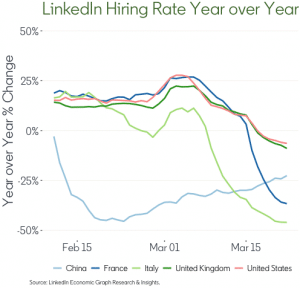Coronavirus has been on the tip of the tongues of every CEO and Chief People Officer. As the virus has taken hold, news has been dominated by headlines of redundancies, lost workforces and companies closing. In these trying times, every action is under scrutiny as we seek to both contain the virus and continue our everyday practice.
For us, and any growing business, questions arise around the subject of hiring. Will the pandemic slow down the hiring process and should it stop companies from hiring altogether? The concern is legitimate. We are not living in normal times.
But not all is doom and gloom for hiring
Based on our research, almost a third of our clients should fare well in this changing economy due to the nature of their services and solutions. And a reassuring 53% are predicted to stay the same size in terms of headcount. The pandemic is testing almost every type of service – regardless of industry. Since this is the case, we are all rapidly implementing the necessary tools and solutions to get through this period of challenge.
Unsurprisingly, we’re seeing a surge in demand for industries like healthtech, connectivity and edtech. Never before has working from home, or the use of digital health services seen such an expansion. As such, those companies who can weather the storm well, should stay focused on their long term goals – ensuring that they have the necessary talent to drive the workforce forward and provide the right solutions to get through this period of challenge.
Don’t fall behind
It’s for this very reason that we must not lose sight of where we are going. While we are facing challenges, we shouldn’t be short of answers. We must instead seek to redefine the journey – not the goal – by clarifying, re-routing and focusing our efforts. If your company is going to make it through, then you will need to have the right leaders in place. Despite the fact that some people have already been laid off, many are still being hired into sectors that are seeing a surge in demand.
Should we stop hiring?
Mariano Mamertino, a Senior Economist at LinkedIn, shared data on the number of hires that countries are doing around the world. From this, we can not only see that the hiring rate has gone down as the impact of COVID-19 has taken hold, but additionally, that it will likely pick up again, as in the case of China (in light blue).

How can I continue to hire while following restrictions and guideline advice?
With countries in lockdown and severe restrictions of movement, modern tech is being applied like never before through the entire recruiting process. Running processes without the usual level of face to face interactions will take some time to adapt to. The challenge is for companies to feel comfortable that they can retain quality in the hiring process. It isn’t how to hire in spite of face to face interviews. Instead, its how to overcome it – by creating ways of getting to know someone out of the usual environment. And so, we’ve come up with a few ideas to help us through this time.
Video calls
An obvious one, but with modern technology readily available people are often more than happy to have online interviews. Video interviews aren’t anything new to the game, but they were usually a precursor to a face to face interview. The future, in the short term, will challenge this. Now that working from home has become the norm, people will become more comfortable with video calls as a stable means for communication – though it will take some time to get used to.
Right now, video interviews give us the ability to progress in the hiring process with a much more flexible approach. One person can conduct the interview, record it and share with the rest of the panel. It’s convenient, time-efficient, easily accessible and most importantly, safe.
Referencing
Referencing is a crucial part of hiring and is especially helpful if you can’t get in front of your candidate. Knowing an individual’s contribution in previous businesses can help to build an image of what they can bring to the table. Not only that, but you can also get a view as to how they communicate and lead, how they might be perceived, and what motivates them. To maximise the potential of referencing, its always best to seek references provided by the candidate, but also to seek opinions beyond that too, sometimes called back-channel referencing. By doing so, you can paint a full picture of the candidate and use this to define how valuable they could be in your business.
Personality tests
Personality tests help to affirm that someone is right for the role, business, and its culture. Designed to assess specific elements of a candidate’s character, they ask a series of questions to deliver insight into a person’s personality. Though we’ve been championing psychometric tests for a long time; not only for assessing the candidate, but also the wider team that they’ll join – to establish how they will fit as a unit; we expect more companies to follow this path to validate their chosen hires – while they might not be able to meet face to face.
The opportunity of acting now
So while our industry presses on with business, it’s critical to remain positive. We should view this period as an opportunity to develop more supportive ways of working, hiring, and achieving the goals that each of our businesses has – setting up the right formula for success, and the right teams to drive it. And instead of stopping hiring, we should use this time to evaluate our own businesses and the talent that’s needed to propel it through this uncertain period. This is the only way we can look to get through, unscathed and in control – ahead of the curve and ahead of the competition



